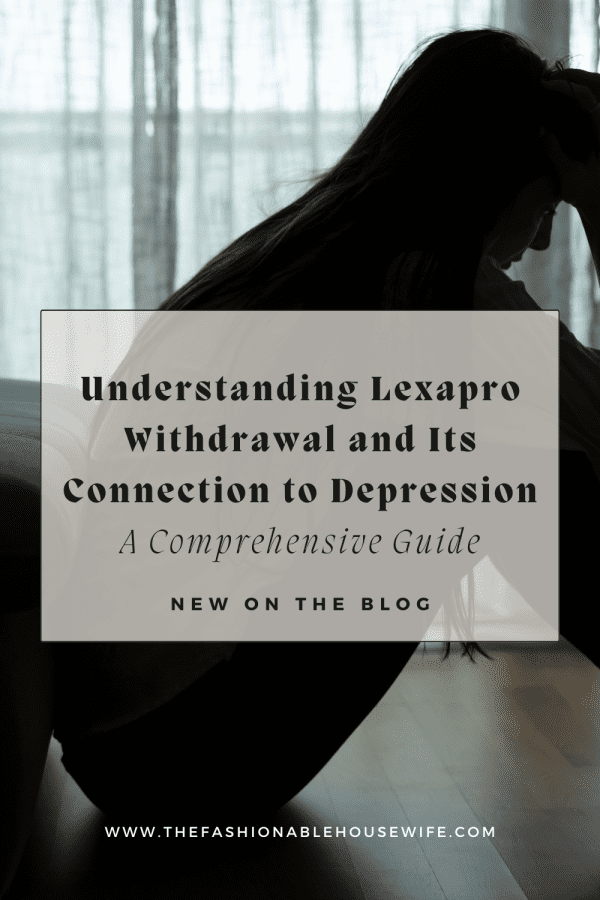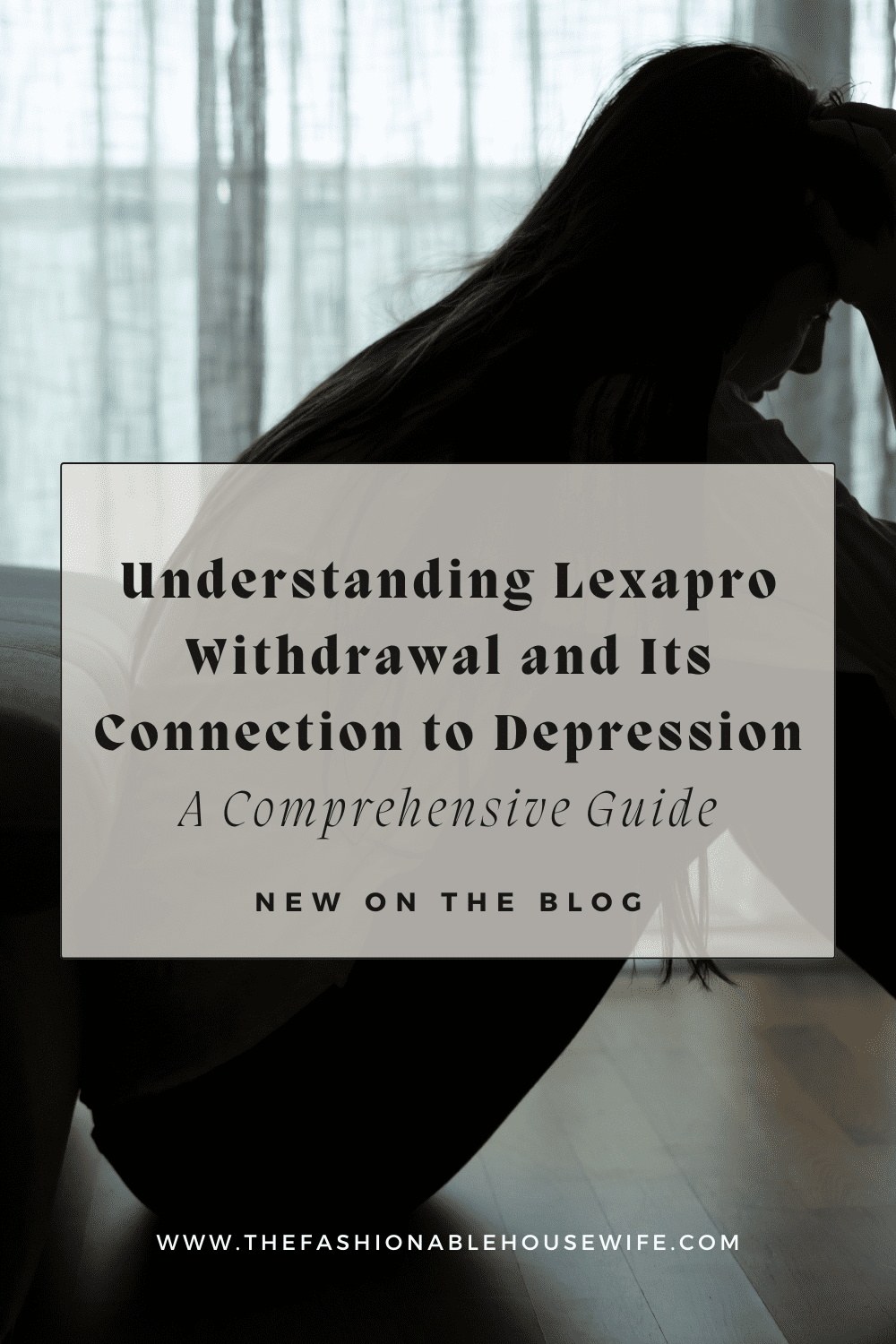Understanding Lexapro Withdrawal and Its Connection to Depression: A Comprehensive Guide

When many people start taking Lexapro, they often experience relief from depression and anxiety. However, stopping the medication can sometimes cause confusing symptoms. These withdrawal effects can look like a relapse of depression, making it hard to tell what’s really happening. This article explains what Lexapro withdrawal is, how it links to depression, and how to handle discontinuing the drug safely.
What Is Lexapro and How Does It Work?
Overview of Lexapro
Lexapro, also known as escitalopram, belongs to a group of drugs called selective serotonin reuptake inhibitors, or SSRIs. It’s one of the most prescribed medications for depression and anxiety today. People often take it to feel better, sleep easier, and regain interest in daily activities.
How It Works
Lexapro works by boosting serotonin levels in the brain. Serotonin is a chemical that helps control mood, sleep, and stress. When you take Lexapro, it keeps more serotonin available, which can lift your mood and ease anxious feelings.
Typical Dosage and Duration
Most people start with a small dose, around 10 mg daily. Doctors may increase or decrease the dose depending on how you respond. Treatment length varies but often lasts several months or years. Longer use can create dependence, which is why stopping needs to be done carefully. The Lexapro withdrawal timeline between 1 week and several months after discontinuing use.
What Is Lexapro Withdrawal?
Definition and Symptoms
Lexapro withdrawal, also called discontinuation syndrome, happens when you stop the medication too quickly. Symptoms can include dizziness, nausea, irritability, flu-like feelings, and strange sensations like brain zaps. Many describe these as uncomfortable but usually temporary.
Who’s at Risk?
Approximately 20-50% of people who suddenly stop Lexapro experience withdrawal symptoms. Risk factors include taking high doses, stopping abruptly, and using the drug for a long time. The longer you use Lexapro, the more careful you need to be when stopping.
The Withdrawal Timeline
Most symptoms appear within a few days after stopping. They tend to peak around the first week and usually fade over the next few weeks. Every person is different, so timing can vary based on individual factors.
How Lexapro Withdrawal Is Linked to Depression
Symptoms That Overlap
Withdrawal symptoms can mimic depression, with mood swings, tiredness, and trouble sleeping. This overlap makes it tricky for both patients and doctors to tell whether symptoms are from withdrawal or a relapse.
Brain Chemistry Changes
When you’re on Lexapro, your serotonin levels are adjusted. Suddenly stopping causes a rapid drop, which may disturb your mood stability. These fluctuations can make it seem like depression has returned, even if it hasn’t.
Psychological Factors
Feeling anxious about losing medication benefits can increase worry. Some might feel more afraid of needing medication long-term, which adds to stress and confusion.
What Patients and Studies Say
Many people report feeling worse after stopping Lexapro. Some research shows withdrawal can temporarily worsen mood symptoms. These effects often resolve with proper management, but they highlight the delicate balance of brain chemistry.
Managing Lexapro Discontinuation Safely
Medical Supervision Matters
Always speak with your doctor before stopping Lexapro. They can guide you through a safe tapering plan. Skipping this step increases the risk of severe withdrawal symptoms.
Tapering Strategies
Gradually reduce your dose over several weeks. For example, cut the dose by 10-25% every few weeks. Regular check-ins with your healthcare provider help catch any warning signs early.
Supportive Therapies
Psychotherapy, like cognitive-behavioral therapy, can help manage symptoms during withdrawal. Lifestyle changes like regular exercise, good sleep habits, and healthy eating also boost mental health.
When to Seek Help
If symptoms become severe, like strong mood swings, suicidal thoughts, or intense physical discomfort, contact your doctor immediately. Do not ignore warning signs of depression coming back.
How to Prevent and Handle Depression After Stopping Lexapro
Staying Mentally Strong Without Medication
Building habits such as exercise, mindfulness, and strong support networks can prevent relapse. Staying proactive keeps your mental health steady even after stopping medication.
Long-term Plans
Regular check-ins with your mental health provider can help adjust treatment if needed. It’s important to stay aware of your mood and symptoms as you transition away from medication.
Expert Advice
Psychiatrists recommend a slow tapering process combined with therapy or lifestyle changes. They warn against abrupt stops which can cause unnecessary suffering or misinterpretation as relapse.
Conclusion
Understanding Lexapro withdrawal is key for safe medication management. It helps prevent unnecessary suffering and confusion. Properly tapering under medical supervision minimizes withdrawal symptoms and makes it easier to tell if depression is returning.
Always talk to your healthcare provider before stopping Lexapro. Keep a strong support system and be prepared to switch to alternative treatments or therapies. Your mental health depends on careful planning, patience, and good guidance. Take control of your journey with knowledge and the right help.

